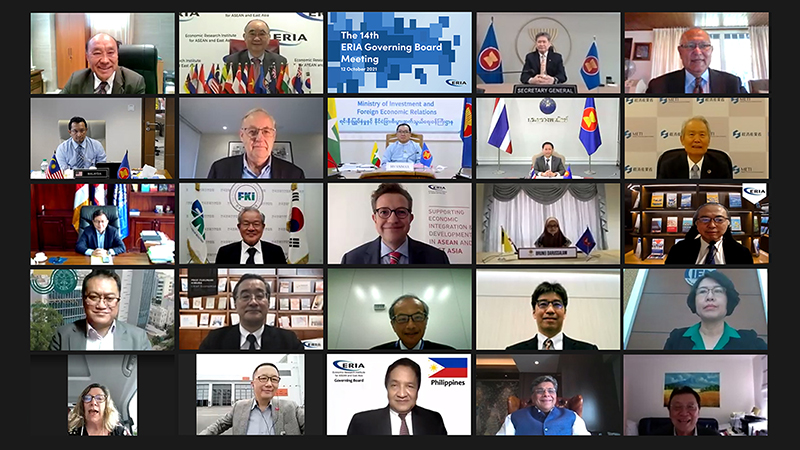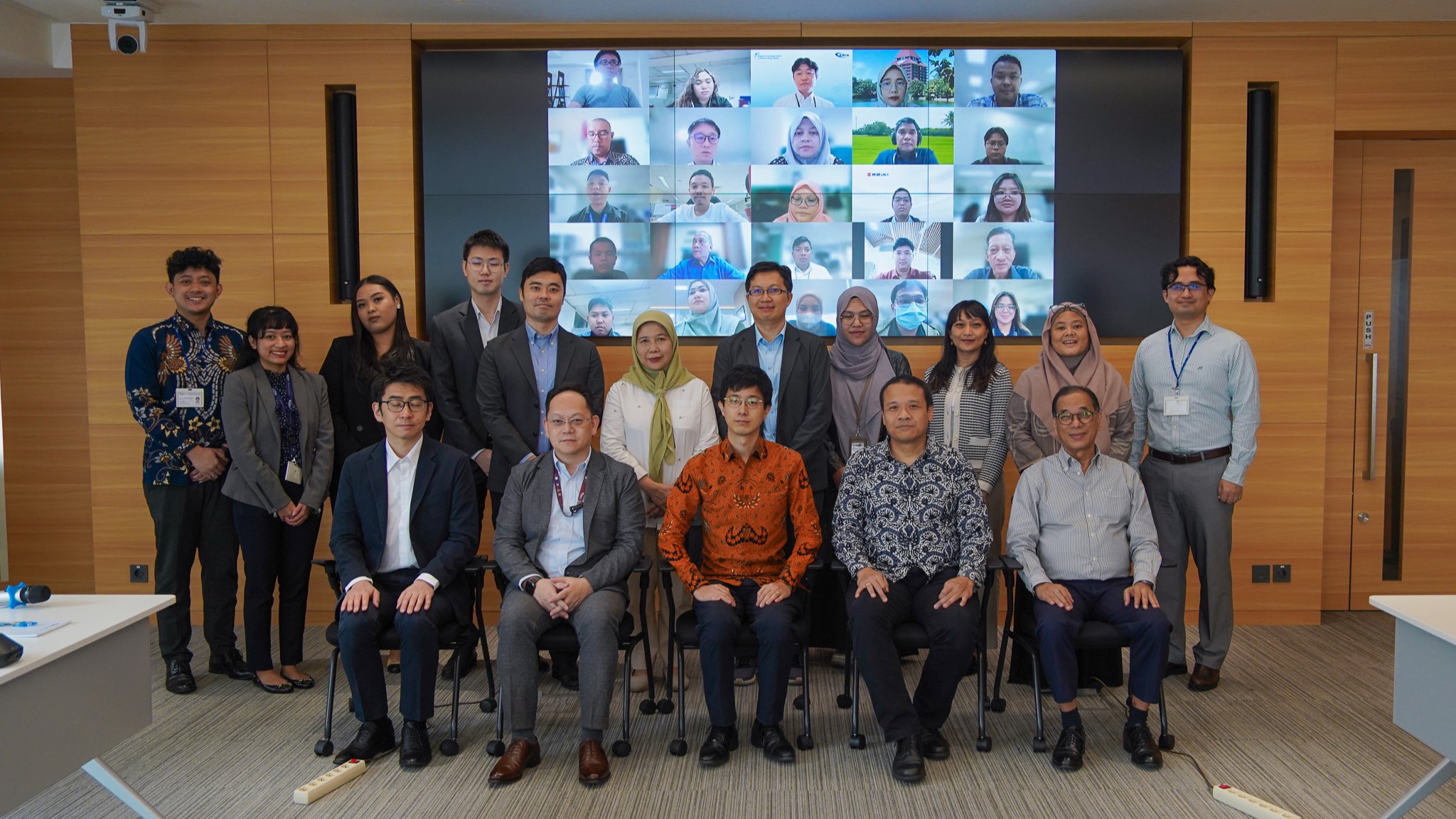ERIA Holds the 14th ERIA Governing Board Meeting
Date:
12 October 2021Category:
NewsTopics:
Governing BoardShare Article:
Print Article:
Jakarta, 12 October 2021: The COVID-19 pandemic has caused unprecedented economic challenges for the ASEAN and East Asia region. With lockdowns, restrictions on the movement of people, supply chain disruption, and access to vaccines among the many issues, the need for evidence-based research is stronger than ever. In addition, the US-China decoupling adds another layer of difficulties that must be addressed.
These issues and more were discussed at the Economic Research Institute for ASEAN and East Asia’s (ERIA) 14th annual Governing Board Meeting. Led by the Interim Chairperson of the Governing Board, Mrs Hajah Mariah Haji Yahya, the Governors discussed how ERIA can play an active role in responding to the aftermath of COVID-19 and supporting the region’s recovery as well as covering general board matters.
In his Opening Remarks, Prof Hidetoshi Nishimura, President of ERIA, highlighted that at the Ninth East Asia Summit (EAS) Economic Ministers Meeting, ERIA presented recommendations on supply chain resilience, scaling up digitalisation, and circular economy. ERIA’s studies were highly commended in the EAS ministerial statements. ERIA also participated in the EAS Energy Ministers Meeting to present low-carbon energy transition scenarios. Prof Nishimura added that together with the ASEAN Secretariat, ERIA is developing 'the ASEAN Guidelines on Promoting the Utilization of Digital Technologies for ASEAN Food and Agricultural Sector'. On marine plastic debris, ERIA has developed the ‘Private Sector Platform’ to promote awareness about what companies across East Asia are doing to address the problem.
During his Welcoming Remarks, H E Dato Paduka Lim Jock Hoi, Secretary-General of ASEAN, stated that some countries still struggle to contain the pandemic, but overall the region is seeing encouraging signs of a turnaround. He said, 'The next stage of ASEAN regional integration demands us to place at the centre collaboration and partnership to bring together a variety of expertise like ERIA as we address the complexities of the emerging challenges we face today, especially in the area of climate change.'
Mr Koji Hachiyama, ERIA COO, delivered remarks emphasising ERIA’s continued focus on research and activities on a wide range of issues including regional economic integration, trade, energy, agriculture, digitalisation, and climate change. He added that ERIA should continue providing strong support to governments in the region to tackle the aftermath of COVID-19 and to understand the future of Southeast and East Asian integration more deeply.
Dr Cielito F Habito, who was officially approved as the new Chairperson of the Governing Board in this meeting, praised ERIA which has become the premier knowledge support institution for ASEAN and East Asia, not only on economic concerns but on a much wider range of development issues concerning the whole region. ERIA’s research and capacity building activities have been responsive to the priorities and requirements of ASEAN and East Asia, both as a group and as individual member states.
Prof Fukunari Kimura, Chief Economist of ERIA, briefed the Governors on the impact of the pandemic on globalization saying that digital technology has actually accelerated globalization. This necessitates protection of the rules-based trading regime under the principle of international commercial policies despite geopolitical tensions.
Prof Jun Arima, ERIA’s Senior Policy Fellow for Energy and Environment, highlighted that the challenge for ASEAN is to advance a low-carbon energy transition and the key strategy for decarbonising ASEAN's energy systems is through energy conservation and electrification in all sectors, along with low-carbon power generation using all available technologies.
Each Governing Board Member then delivered their response to these comments which are captured in the Governing Board Statement. ERIA Governors conveyed their views on the aftermath of COVID-19 and its impact on the global and regional economy. They discussed the need for research on supply chains, digital transformation, sustainability, climate change, finance, trade, and investment and the important role that ERIA can play.
Prof Nishimura noted that in 2022 ERIA will cooperate and support Cambodia’s chairmanship of ASEAN by providing policy-based research especially on how the region can overcome challenges and push for a vibrant and harmonious economic community. ERIA also will support Indonesia’s chairmanship of the G20.
The Governing Board is the decision-making body of ERIA and consists of the Secretary-General of ASEAN and representatives from each of the 16 member countries.
The Board is responsible to oversee the management of ERIA and approve its operation. It was the first meeting for some of the new Governors: Brunei Darussalam -  Mrs Hajah Mariah Haji Yahya, Director General of Economic Planning and Statistics, Ministry of Finance and Economy of Brunei Darussalam; Myanmar - HE Mr Than Aung Kyaw, Deputy Minister for Investment and Foreign Economic Relations, Ministry of Investment and Foreign Economic Relations of Myanmar; Philippines - Dr Cielito F Habito, Professor of Economics at the Ateneo de Manila University, Chairman of Brain Trust Inc., and Former Secretary (Minister) of Socioeconomic Planning of the Philippines; and Acting Governor of Australia - Ms Elisabeth Bowes, First Assistant Secretary and Chief Negotiator of Department of Foreign Affairs and Trade of Australia.




